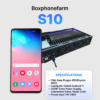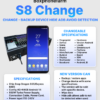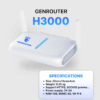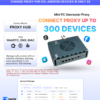In the world of digital marketing, MMO (Making Money Online), and large-scale automation, a critical debate is always present: should you own your hardware or rent it from the cloud? This question is central to the cloud phone vs physical phone farm discussion. Choosing the right path can significantly impact your costs, scalability, and overall efficiency. This article provides a deep-dive comparison to help you understand which model—owning physical devices or leasing virtual ones—is the right fit for your automation goals in 2025.
1. Defining the Terms: What Are We Comparing?
Before diving into the analysis, it’s crucial to have clear definitions. While both serve the purpose of running multiple mobile instances for automation, their underlying structures are fundamentally different.
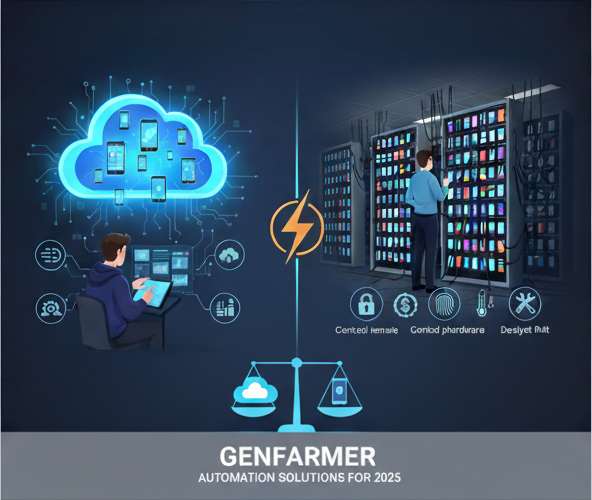
1.1. What is a Physical Phone Farm?
A physical phone farm is a collection of real, tangible smartphones connected to one or more computers. These devices are centrally managed through specialized hardware, like a Box Phone Farm, and software. Each phone operates as a distinct entity with its own hardware signature (IMEI, serial number, etc.), SIM card capability, and physical screen. This setup gives you direct, granular control over real-world devices for tasks like social media account nurturing, app testing, or running mobile games.
1.2. What is a Cloud Phone?
A Cloud Phone, also known as a virtual mobile or emulated device, is a software-based simulation of a smartphone that runs on powerful servers in a data center. Users access and control these virtual devices remotely through the internet. A cloud phone mimics the Android or iOS operating system and can install and run apps just like a physical device. The key difference is that there is no physical hardware for you to manage; you are essentially renting a virtualized instance of a phone.
2. The Case for a Physical Phone Farm
Building your own infrastructure with real devices has been the traditional approach for serious automation experts. It offers a unique set of advantages and disadvantages that make it ideal for specific use cases.
2.1. Advantages of a Physical Phone Farm
- Total Hardware Control: You own the devices. This means you can choose the exact models, Android/iOS versions, and physical configurations. You can physically insert SIM cards, connect to specific Wi-Fi networks, and manage peripherals without any restrictions from a third-party provider.
- Authentic Device Fingerprints: Each physical phone has a genuine, unique hardware fingerprint (IMEI, MAC address, manufacturer details). This is extremely difficult for platforms to flag as suspicious, making physical farms the gold standard for tasks requiring high levels of trust and avoiding detection, such as creating and managing social media accounts.
- Potentially Lower Long-Term Costs: While the initial investment can be high, the long-term operational costs can be lower than a subscription model. If you use refurbished or older devices, the upfront cost can also be managed. After the initial purchase, your main ongoing costs are electricity and internet.
2.2. Disadvantages of a Physical Phone Farm
- Physical Space Requirement: A farm of 20, 50, or 100+ phones requires dedicated physical space. This includes shelving, proper ventilation, and a lot of cabling.
- Power and Heat Management: Running dozens of devices 24/7 generates significant heat and consumes a considerable amount of electricity. Proper cooling and power management are non-negotiable to prevent hardware failure.
- Hardware Maintenance: Physical devices can fail. Screens crack, batteries degrade, and ports wear out. You are responsible for all repairs, replacements, and general maintenance, which requires time and technical skill.
- High Upfront Cost: The initial capital expenditure for purchasing new devices, control hardware (like a Box Phone Farm), and networking equipment can be substantial.
3. The Case for Cloud Phones
Cloud phones represent a modern, flexible approach to mobile automation. By abstracting away the hardware, they offer convenience and speed, making them an attractive option for many users.
3.1. Advantages of Cloud Phones
- Instant Scalability: This is the biggest selling point. Need to go from 10 to 100 devices? With a cloud phone service, it’s often just a few clicks. There’s no need to order, set up, and cable new hardware. You can scale up for a big project and scale back down when it’s over.
- No Physical Management: Forget about electricity bills, cooling systems, and broken cables. The provider handles all hardware maintenance, power, and space requirements. This frees you to focus purely on your automation strategy.
- Access from Anywhere: Since the devices are hosted in the cloud, you can access and manage your entire farm from any computer with an internet connection, offering unparalleled flexibility for remote teams and individuals.
- Ideal for Quick Testing and Development: Cloud phones are perfect for developers who need to test an app on various device models and OS versions without buying each one, or for marketers who want to run a short-term campaign.
3.2. Disadvantages of Cloud Phones
- Ongoing Subscription Costs: The pay-as-you-go model is a double-edged sword. While it eliminates upfront costs, the recurring monthly fees can add up significantly over time, especially for a large number of devices running 24/7. This can make it more expensive than a physical farm in the long run.
- Less Control Over Hardware: You are limited to the device models and configurations offered by the provider. You can’t control the underlying physical server or perform hardware-level modifications.
- Higher Risk of Detection: While providers work hard to make their virtual devices appear real, they are still running in a data center environment. Sophisticated platforms can sometimes detect patterns in IP addresses, network configurations, or subtle virtualization artifacts, potentially leading to a higher flag rate for sensitive tasks compared to a physical phone farm.
4. GenFarmer: The Hybrid Solution for Every Need
At GenFarmer, we understand that the cloud phone vs physical phone farm choice isn’t always straightforward. That’s why we’ve built an ecosystem that offers the best of both worlds. We don’t force you into a single solution; we empower you with options.
Our strategy is designed for seamless growth:
- Start with GenFarmer Cloud Phones: If you’re new to automation, want to test a strategy, or need flexibility, you can rent our high-quality Cloud Phones. It’s a low-risk, zero-setup way to get started immediately.
- Scale with a GenFarmer Box Phone Farm: Once your strategy is proven and you’re ready for serious, long-term scaling, you can invest in our robust Box Phone Farm hardware. This move will significantly lower your long-term operating costs while giving you maximum control and authenticity.
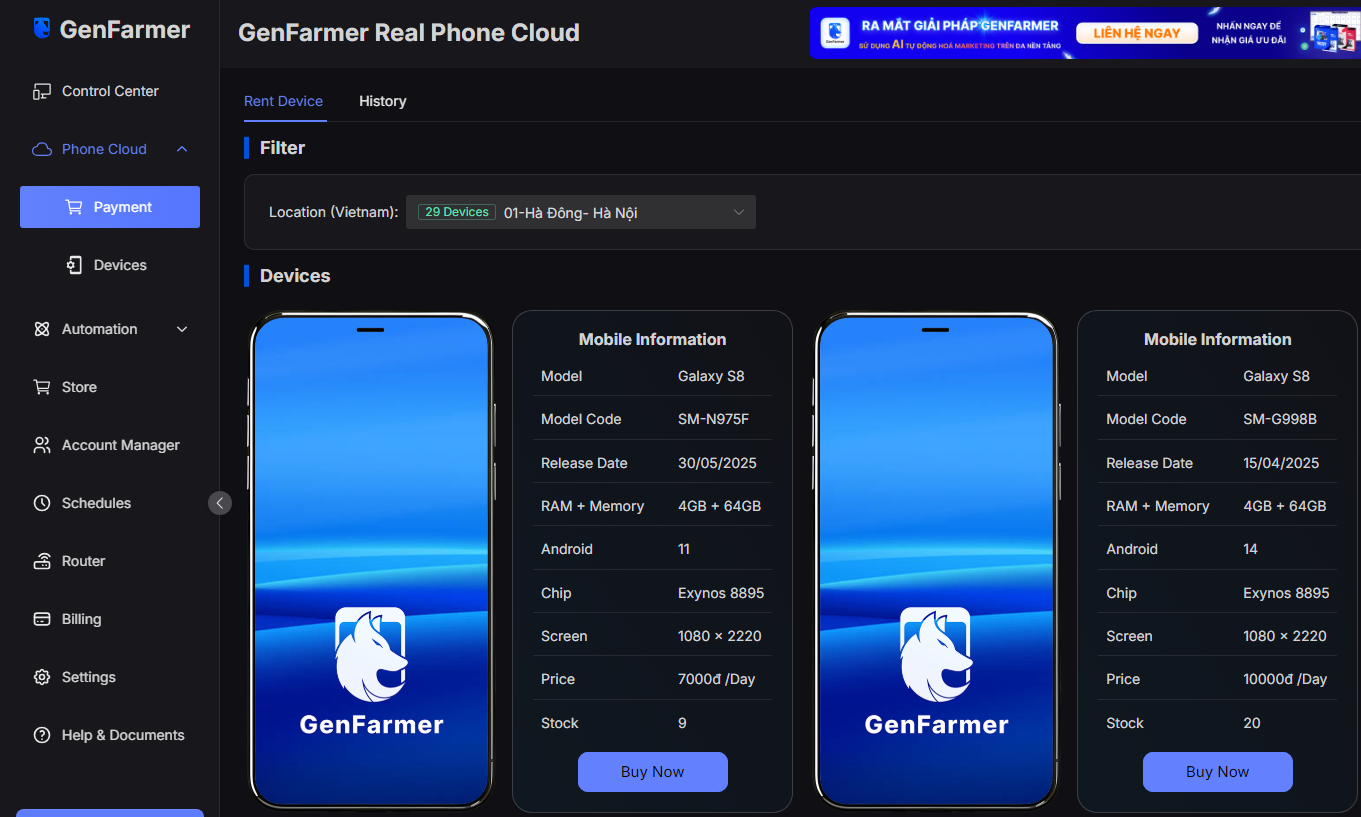
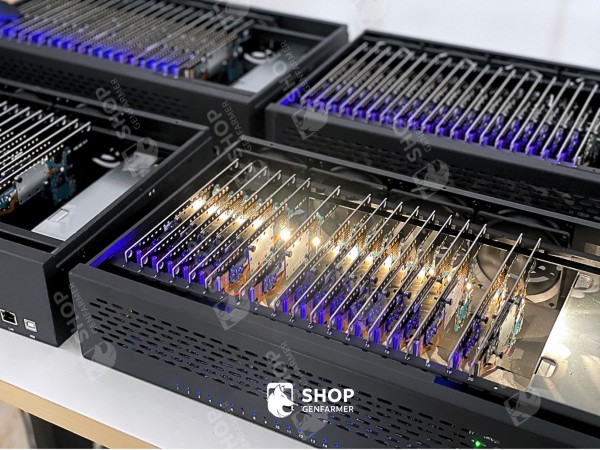
We provide the platform and the hardware, allowing you to transition smoothly from renting to owning as your business needs evolve. You can even use both simultaneously for a truly hybrid approach.
Conclusion: There Is No Single Best Answer
Ultimately, the winner of the cloud phone vs physical phone farm debate depends entirely on your specific situation.
- Choose Cloud Phones if you value flexibility, speed, low upfront costs, and want to avoid hardware management. It’s perfect for startups, developers, and short-term projects.
- Choose a Physical Phone Farm if you are planning for long-term, large-scale operation, require maximum account trust and security, and are comfortable with managing physical hardware to achieve the lowest possible long-term cost.
The most important takeaway is that you have options. At GenFarmer, we are committed to providing you with the tools you need, whether they are in the cloud or on your desk. We support both paths to success in the world of automation.
Ready to start your automation journey? Explore our solutions and find the perfect fit for your goals.







